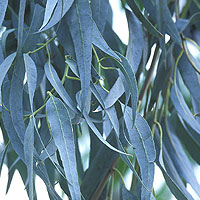Search Healthnotes
Eucalyptus
 © Martin Wall
© Martin WallHow It Works
The major constituent in eucalyptus leaves is a volatile oil known as eucalyptol (1,8-cineol). In order to provide an effective expectorant and antiseptic action, the leaf oil should contain approximately 70–85% eucalyptol.3 Eucalyptus oil is said to function in a fashion similar to that of menthol by acting on receptors in the nasal mucosa, leading to a reduction in symptoms such as nasal congestion.4 In test tube studies, eucalyptus species have been shown to possess antibacterial actions against such organisms as Bacillus subtilis,5 as well as several strains of Streptococcus.6 These actions have not been researched in human clinical trials.
Peppermint (10 grams) and eucalyptus oil (5 grams) in combination, applied topically to the forehead and temples for three minutes with a small sponge, have been shown to be helpful as a muscle relaxant (but not for pain relief) in people with tension headaches.7 A eucalyptus oil extract containing 50% p-methane-3,8-diol (PMD) as the active ingredient has been shown to be effective in protecting human volunteers from various types of biting insects.8 On human forearms, it was determined that the eucalyptus extract was nearly as effective as a 20% solution of diethyltoluamine (used in many insect repellents) in repelling bites of the Anopheles mosquito (the insect that spreads malaria) for up to five hours. The eucalyptus extract was also effective at repelling flies (94%) and midges (100%) for up to six hours.
A preliminary study suggests the combination of eucalyptus and menthol as a nasal inhalant is helpful in cases of mild to moderate snoring.9 Also, in a double-blind trial, a eucalyptus-based rub was found helpful for warming muscles in athletes.10 This further suggests eucalyptus may help relieve minor muscle soreness when applied topically, though studies are needed to confirm this possibility.
How to Use It
Eucalyptus oil (0.05–0.2 ml per day) can be taken internally by adults.11 It should always be diluted in warm water before consuming. For local applications, 30 ml of the oil can be mixed in 500 ml of lukewarm water and applied topically as an insect repellent or used over the temporal areas of the forehead for tension headaches. As an inhalant, add a few drops of eucalyptus oil to hot water or a vaporizer. Deeply inhale the steam vapor. For eucalyptus leaf preparations, an infusion of 2–3 grams of the chopped leaves may be boiled in 150 ml of water and taken two times per day. Eucalyptus oil needs to be used very cautiously since as little as 3.5 ml of the oil taken internally has proven fatal.12 It is best for people to discuss internal use with a qualified healthcare professional.
Warning: Eucalyptus oil needs to be used very cautiously since as little as 3.5 ml of the oil taken internally has proven fatal. It is best for individuals to discuss internal use with a qualified healthcare professional.
Copyright © 2024 TraceGains, Inc. All rights reserved.
Learn more about TraceGains, the company.
The information presented by TraceGains is for informational purposes only. It is based on scientific studies (human, animal, or in vitro), clinical experience, or traditional usage as cited in each article. The results reported may not necessarily occur in all individuals. Self-treatment is not recommended for life-threatening conditions that require medical treatment under a doctor's care. For many of the conditions discussed, treatment with prescription or over the counter medication is also available. Consult your doctor, practitioner, and/or pharmacist for any health problem and before using any supplements or before making any changes in prescribed medications. Information expires December 2024.











